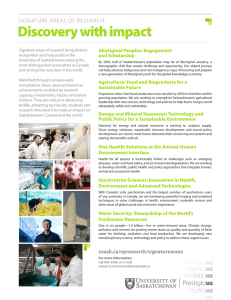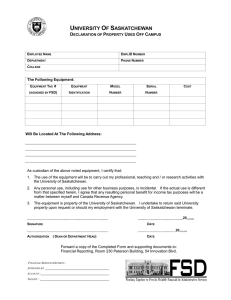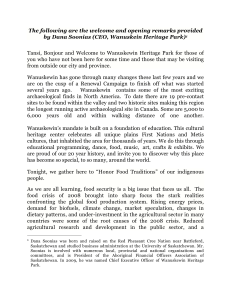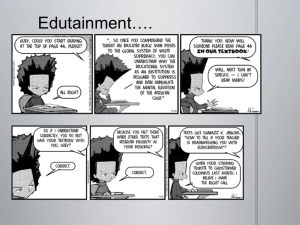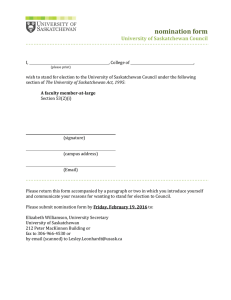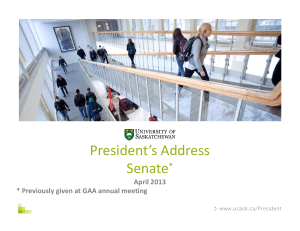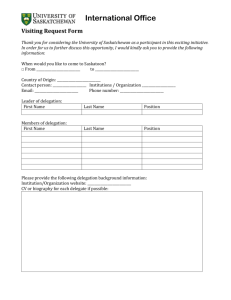UNIVERSITY COUNCIL Fran Walley, chair Planning and Priorities Committee
advertisement
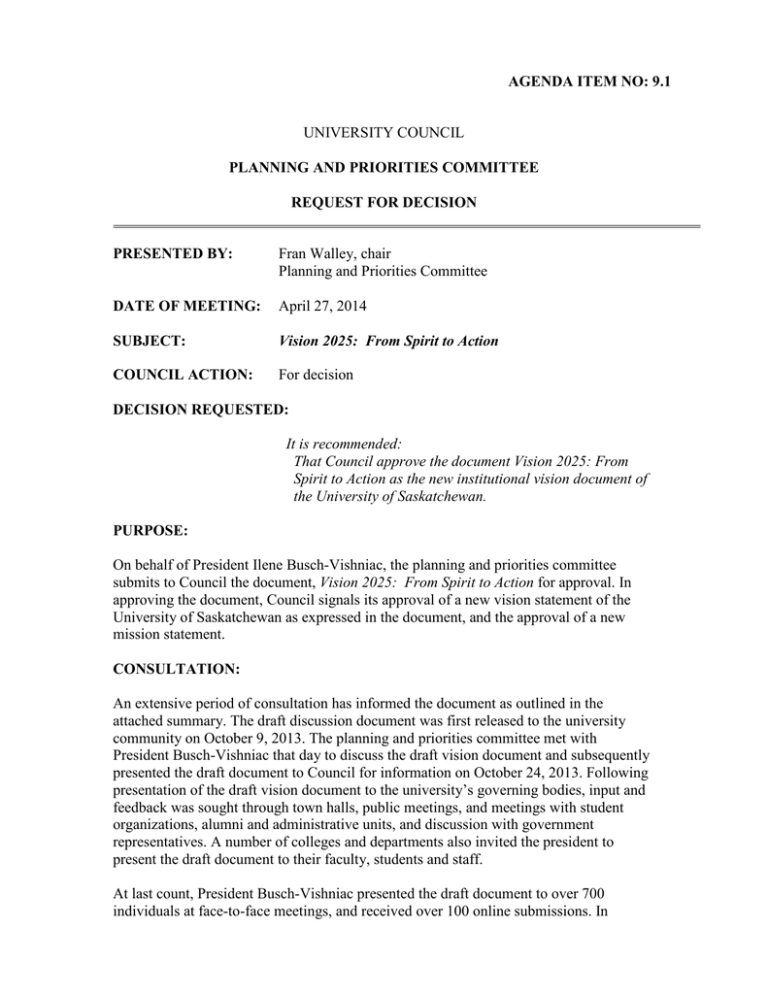
AGENDA ITEM NO: 9.1 UNIVERSITY COUNCIL PLANNING AND PRIORITIES COMMITTEE REQUEST FOR DECISION PRESENTED BY: Fran Walley, chair Planning and Priorities Committee DATE OF MEETING: April 27, 2014 SUBJECT: Vision 2025: From Spirit to Action COUNCIL ACTION: For decision DECISION REQUESTED: It is recommended: That Council approve the document Vision 2025: From Spirit to Action as the new institutional vision document of the University of Saskatchewan. PURPOSE: On behalf of President Ilene Busch-Vishniac, the planning and priorities committee submits to Council the document, Vision 2025: From Spirit to Action for approval. In approving the document, Council signals its approval of a new vision statement of the University of Saskatchewan as expressed in the document, and the approval of a new mission statement. CONSULTATION: An extensive period of consultation has informed the document as outlined in the attached summary. The draft discussion document was first released to the university community on October 9, 2013. The planning and priorities committee met with President Busch-Vishniac that day to discuss the draft vision document and subsequently presented the draft document to Council for information on October 24, 2013. Following presentation of the draft vision document to the university’s governing bodies, input and feedback was sought through town halls, public meetings, and meetings with student organizations, alumni and administrative units, and discussion with government representatives. A number of colleges and departments also invited the president to present the draft document to their faculty, students and staff. At last count, President Busch-Vishniac presented the draft document to over 700 individuals at face-to-face meetings, and received over 100 online submissions. In response, substantive revisions to the document included an expansion of the values expressed, the incorporation of language from The Learning Charter and an entirely new section on Aboriginal engagement. The themes of advanced learning and discovery, enhancing Aboriginal engagement and inspiring lifelong citizenship were identified and highlighted in the document. A section on guiding principles was added to articulate how the university will express its chosen principles through actions. In terms of format, the document was reorganized to articulate the themes and eliminate overlapping sections. The planning and priorities committee discussed the revised vision document at its meetings on March 19 and April 2, 2014. Substantive revisions requested included strengthening the value statement on creativity, innovation, critical thinking and courage, and removing the reference to the examples of areas of academic excellence under the heading, “We will lead in our signature areas of focus and build on our strengths.” The suggested revisions were made, and on April 4, 2014, the committee carried a motion to recommend that Council approve the Vision 2025 document as the new institutional vision document of the University of Saskatchewan. One minority view held that the document is vague and fragmentary and the desire for more explicit language was expressed. A firm and continuing commitment to the fine arts and humanities within the vision document was also desired. SUMMARY: The Vision 2025 document is intended to become an institutional statement of the university’s broadest goals and objectives and lay the foundation for the university’s future integrated plans and foundational documents. The document speaks to the university’s collective mission, vision, values and guiding principles. As such, it is appropriate that Council be asked to approve the Vision 2025 document to voice its support of this collective vision and direction of the university. FURTHER ACTION REQUIRED: Approval by Senate will be sought at the April 26 Senate meeting; approval by the Board of Governors will be sought at the May 27 Board meeting. ATTACHMENTS: 1. Vision 2025: From Spirit to Action 2. Consultation Summary Submitted to University Council – April 2014 University of Saskatchewan Vision 2025: From Spirit to Action Our Mission To excel in learning and discovery, and the integration, application and preservation of knowledge in order to shape the province of Saskatchewan, promote social, policy and cultural innovation and enable students and graduates to become active and responsible global citizens. Our Vision To be recognized among the most distinguished research-intensive universities in North America, and world-leading in targeted areas of education and research, knowing that we serve Saskatchewan best by helping to solve global challenges that have particular relevance to our region and by striving to lead the nation in Aboriginal post-secondary education initiatives that meet community needs. Our Values Our values, inspired by our history and place, are critical to achieving our vision. They will guide us as we move from spirit to action. We price and encourage creativity, innovation, critical thinking and courage: We value creative, innovative and critical thinking that advances knowledge within and across disciplines, and have the courage to challenge preconceived notions. We honour our sense of our land and our place: We value our strong sense of community, our culture of collaboration, and our connections to the land. We are proud of our prairie and northern resourcefulness and respect our history of achievement through perseverance and vision. We value our determined and innovative “can-do” spirit that has led to many of our successes and will continue to distinguish us. We appreciate community and a desire to work together with a sense of shared purpose: We value our enduring relationships with our many local, national and international partners that enable us to work together towards our common goals. [1] Submitted to University Council – April 2014 We foster diversity with equity built through relationships, reciprocity, respect and relevance: We value being an open, welcoming and supportive university with equal opportunities for everyone. We respect all members of our community and their diverse contributions in advancing the university’s goals and enriching the community for all. We prize academic freedom, institutional autonomy and ambition: We value our institutional independence and the academic freedom to ambitiously engage in the open pursuit of knowledge, including controversial matters, while practising scholarly responsibility. Our place in the post-secondary landscape Situated on the banks of the South Saskatchewan River, the University of Saskatchewan sits in Treaty Six territory and on land long used by the First Nations and Métis of this area. On this site, with our elegant stone buildings and vast green space, our campus is widely known to be one of the most beautiful in Canada and an inspiring place to work and learn. Here, for more than a century, we have led far-sighted research and innovation to help grow a province, partnering with communities, farmers and businesses to achieve these gains. Now, increasingly, the University is recognizing our connections and commitments to Aboriginal people of this territory. We are proud of our partnerships with Aboriginal communities. These have brought us to a leadership role in First Nations, Métis and Inuit student engagement in Canada. In Saskatchewan’s changing demographics and fast-growing economy, we play a key role in enabling Saskatchewan people to find employment in this province and in attracting new, highly talented citizens. The University of Saskatchewan is a member of the U15 group of Canada’s leading research-intensive universities. Collaboration is our signature trait: we rate very highly compared to our U15 peers in the extent of our research collaboration with other institutions, industries and communities. Our key partners include: U15 institutions and similar universities outside Canada; post-secondary institutions in the province, especially our federated college, St. Thomas More; the Government of Saskatchewan and other provincial governments; the federal government; funding organizations, alumni and donors who support our mission; and prominent businesses, social agencies and arts communities. Given our relationships outside Canada, partnerships with governments of our international partners are also important. Uniquely among Canadian universities, we host two national laboratories—the Canadian Light Source synchrotron and VIDO-InterVac, a state-of-the-art facility at the forefront of infectious disease research. We also lead a distributed national facility, the SuperDARN network of radars. We are strong in research commercialization, ranking high in national rankings of licensing revenue and driving innovation through partnerships. Our peers are the 14 other research-intensive universities of Canada. Our benchmarking is routinely against this group of peers. [2] Submitted to University Council – April 2014 Where will we leave our mark? We will build on the unique, special and distinguishing attributes of the University of Saskatchewan to leave a lasting legacy, focusing on commitment in three key areas: advancing our learning and discovery mission, enhancing Aboriginal engagement, and inspiring lifelong citizenship. ADVANCING LEARNING AND DISCOVERY We recognize that the primary mission of any University is learning and discovery and believe that each is best accomplished in the presence of the other. We value both curiosity-driven and application-driven research, scholarly and artistic work. We are positioned to capitalize on our geographical and historical attributes to continue to distinguish ourselves as one of the top research-intensive universities in North America. We will lead in our signature areas of focus and build on our strengths. We recognize areas in which our research and academic programs establish our pre-eminence. These include our signature areas (water, food, extractive industries, one health, synchrotron science and Aboriginal peoples) and other areas of excellence across our many colleges and schools. We will continue to lead in these matters and expand our areas of academic world leadership. We will generate, communicate, and apply new knowledge in our areas of excellence, and become the “go-to” place for Saskatchewan-made solutions and discussion of relevant global issues. We will leverage these research strengths and continue to foster other emerging strengths to expand our academic leadership globally. We will capitalize on the synergies that our unique breadth offers in both our learning and discovery missions, taking multidisciplinary approaches to global challenges. We are the Canadian university with the broadest disciplinary coverage. This diversity in academic programs, in ways of knowing and learning and in research, scholarly and artistic work enables us to consider the world’s most difficult challenges from many perspectives simultaneously. We will emphasize team learning and discovery experiences. While we value and reward both individual and team research, our history has demonstrated that we are stronger when we work together. We will seek out learning and discovery opportunities that allow us to honour our sense of place as a strong community with a culture of collaboration. We will emphasize team experiences for students and create physical spaces that encourage interaction. [3] Submitted to University Council – April 2014 We will be distinguished as a leader in community-based scholarship and education. We will continue building strong partnerships with community-based organizations around our discovery and learning missions and presenting opportunities for engagement by students, staff and faculty. We will excel in and distribute high quality education, research and clinical training in the health fields throughout the province. We will increase the participation rates in post-secondary education in Saskatchewan by working to eliminate or transcend the barriers that currently prevent many people in rural and northern Saskatchewan from accessing a university education. We will expand our programming outside of Saskatoon and make it possible for Saskatchewan people to pursue degrees without leaving their homes and support structures. A particularly important domain in which the university interacts strongly with our community is through our health disciplines. A key goal for the coming decades is to improve the performance in our healthrelated fields in education and research. ENHANCING ABORIGINAL ENGAGEMENT We recognize that scholarly traditions and institutions, including our own, have often excluded First Nations, Métis and Inuit people and knowledge. We will change this legacy at the University of Saskatchewan. As the Canadian research-intensive university with the highest percentage of self-identified Aboriginal students and the highest proportion of provincial residents identifying as First Nations, Métis and Inuit, we have a special role to play in modeling a university that offers Aboriginal students, and all students, equitable access to an education and to university services. In partnership with Saskatchewan Indigenous communities, we are uniquely positioned to identify the characteristics of such a university, to articulate the principles that will guide the transition, and to make the changes that will ensure the success of our Aboriginal students. We will meaningfully incorporate Indigenous knowledge and perspectives into the curriculum, into research, scholarly and artistic work, into operations and into the physical identity of the University of Saskatchewan. We will become a place where traditional Indigenous ways of knowing and Western scholarly ways of knowing will meet, engage, and sometimes intertwine, for the mutual enrichment of both. In this coming together, we will respect both scholarly traditions and Indigenous traditions, acknowledging that both include knowledge, histories, values, cultural practices, and governance systems. [4] Submitted to University Council – April 2014 We will work to eliminate systemic barriers within our own practices and to strengthen supports for Aboriginal students, including academic, social, and cultural programs. Our efforts will be sensitive to the immediate challenges and systemic barriers inhibiting access and academic success for Aboriginal students and to take steps to improve the system. We will ensure Aboriginal students see themselves and their experiences reflected in the university’s academic and administrative leadership. We will recruit and retain Aboriginal faculty and staff in a variety of fields and roles. We will ensure we recognize and develop leadership capacity among First Nations, Métis and Inuit students, faculty and staff in order to build a diverse community at all levels and to establish a supportive environment. INSPIRING LIFELONG CITIZENSHIP We expect our students, faculty, and staff to be engaged members of our campus, local and global communities, connecting and contributing to help make our communities stronger. We aim to inspire students who value diversity, share their knowledge and continuously exercise leadership long after graduation. We will be strategic in our student recruitment, seeking out students who not only excel academically but also demonstrate citizenship and capacity for leadership We will align our recruitment strategies to best reflect the type of community we want to build. Our top students will not only excel academically but they will also show their commitment to their communities and to society-at-large. This approach serves the province, not only through attracting new highly talented individuals, but by raising the degree completion rates across the board, enhancing our visibility nationally and internationally, and shaping the leaders of tomorrow. We value leadership within our community and will assess, develop and reward leadership skills across the university. We will do more to groom students, faculty and staff for leadership at all levels of the university. We will describe the characteristics needed to support innovation, creativity, nimbleness and responsiveness, and then create the opportunities that allow people to grow and exercise skills in these areas. [5] Submitted to University Council – April 2014 We will help students to succeed in their fields, equipping them for the future with the skills, attributes and values to keep learning long after they have graduated. We accept that career preparation is part of our mandate, but rather than training individuals for particular job opportunities or to work for specific companies we will equip them to be continuous learners and to seek out every opportunity to develop themselves. Our graduates will reflect our institutional values and in particular will be known for learning actively, thinking broadly, acting ethically, and engaging respectfully. What will be our guiding principles? The University of Saskatchewan chooses to be principle-driven in its actions and decisions. We recognize the following principles that will help create and maintain the environment that enables us to reach our vision. People We will put students at the centre of our programs and planning. We will have our alumni recognize the university as having played a major role in their lives. We will embrace diversity and actively promote equity in fulfilling our mission. We will ensure our employees reflect the values of the university, and it is our responsibility to make certain that we embed sufficient professional development in our operations so that our personnel can grow their skills and expand their knowledge. We will position ourselves to be competitive and we will reward outstanding performance. We will ensure that our structures do not ossify, that we have sufficient flexibility to respond to change and be nimble. We will change how we view technology – seeing it as a means of changing the nature of our work and study rather than simply a means of automating processes conceived in an earlier age. Programs and Planning We will refer to our mission, vision and values in making hard decisions at all levels. We are prepared to take some difficult actions to preserve integrity of mission. We will honour a culture of planning, implementing plans and evidence-based decision-making. Institutionally, we will define a set of key performance indicators that provide a snapshot of performance and are regularly presented to the public and our governing bodies. We will identify areas in which risk-taking should be valued but also be clear about areas in which we should be risk-averse. We will grow our academic programs and our student numbers only when we can do so while maintaining or improving upon our learning and discovery standards and the quality of the student experience. [6] Submitted to University Council – April 2014 We will increase our efforts to ensure that people throughout the world are aware of our accomplishments. We will publish our results and we will publicize those accomplishments of particular importance to our local, provincial, national, or global community. We will be transparent and accountable in our decision-making. We will retain our autonomy so that decisions are based not on expediency but on our best judgments tempered by public discussion with interested parties. Resources, Focus and Partnership We will resist the temptation to see funding as more than it is – a resource rather than a driver of what we, as a public institution, can do. We will model how a university achieves financial, social and environmental sustainability in the long term, through planning and attention to mission and priorities. We will ensure that our resources are distributed appropriately – neither massed in a narrow portion of our mission, nor spread so thinly that we are incapable of excelling in any part of our mandate. We will partner where it is clear that such a partnership is in the best interest of all involved and preferable to competition. Partnerships are especially valued when they link to both our discovery and learning missions. We will only grow new research or teaching programs that may be found elsewhere within the province if we can provide added value, capitalize on unique opportunities at the University of Saskatchewan, or respond to unmet demand. We will craft mechanisms to help us select which opportunities we will respond to in a timely fashion. The University of Saskatchewan in 2025 Achieving this vision of a more engaged and research-intensive university will require innovative thinking, commitment, and a willingness to challenge established processes and structures. Building on our proud history, our strengths, and our outstanding talent, we are determined to make the changes needed to take this institution to the next level of academic, research and community engagement by the end of this quarter century. [7] Groups Consulted/Provided Feedback ‐‐ as of Feb. 2014 Governing Bodies Board of Governors Senate University Council ‐‐ Council Chairs University Council ‐‐ PPC University Council ‐‐ TLARC University Council ‐‐ RSAW University Council Student Organizations USSU Executive University Student's Council GSA Executive Indigenous Student's Council Aboriginal Student Leadership Group Aboriginal and Indigenous Graduate Student's Council Administrative Bodies President's Executive (Vice‐Presidents, University Secretary) Senior Leadership Forum (Deans, EDs, and Senior Administrative Leaders) Department Heads Colleges and Dept. Dept. of Chemistry Dept. of Music Engineering and Science Library Education and Music Library Engineering Faculty Council Education Faculty Council STM Faculty Council SENS Faculty Council Library Dean's Office Administrative Units Office of Vice‐President Research Office of Vice‐President, Finance and Resources Advancement and Community Engagement ULC/GMCTE SESD STM Senior Admin Huskie Athletics ICT External Consultations Alumni Association Board Alumni Dinner ‐‐ Ottawa Alumni Dinner ‐‐ Regina Alumni Dinner ‐‐ Vancouver Alumni Dinner ‐‐ Victoria Chamber of Commerce Executive Gov't ‐ Deputy Ministers Gov't ‐‐ Advanced Education Gov't ‐‐ Sask. Federal Council Gov't ‐‐ Labour Relations and Workplace Safety FSIN Education Commission Open Consultations Town Hall Special President's Breakfast (3) Blog and E‐mail (approx. 100 responses)
